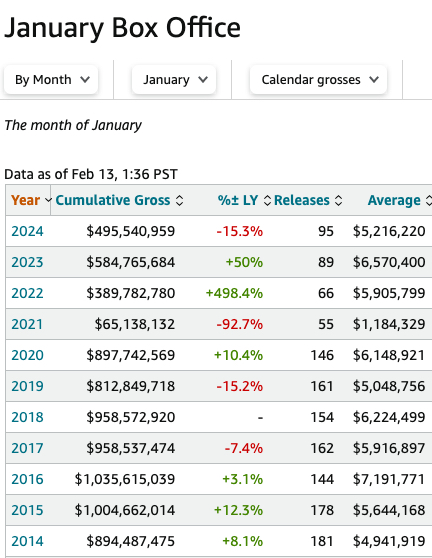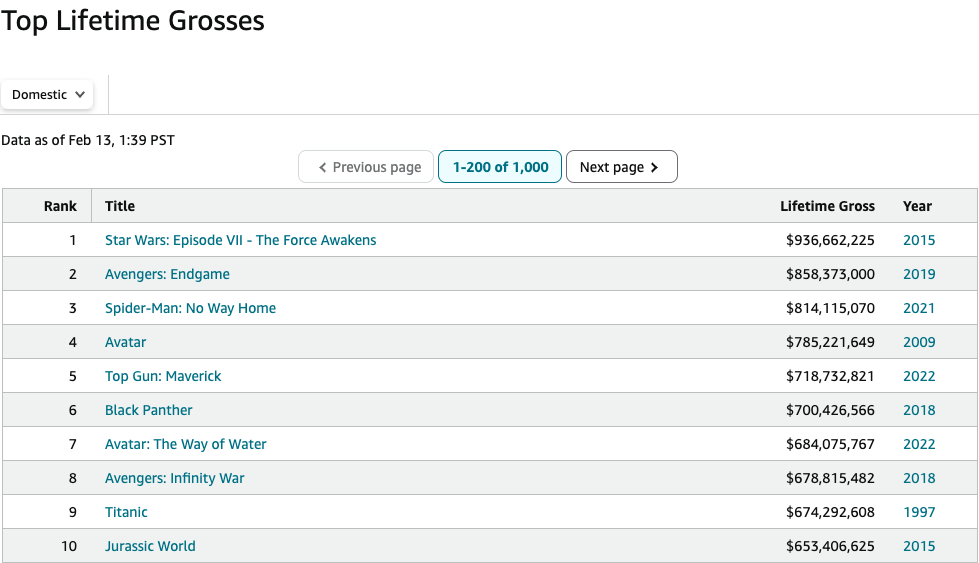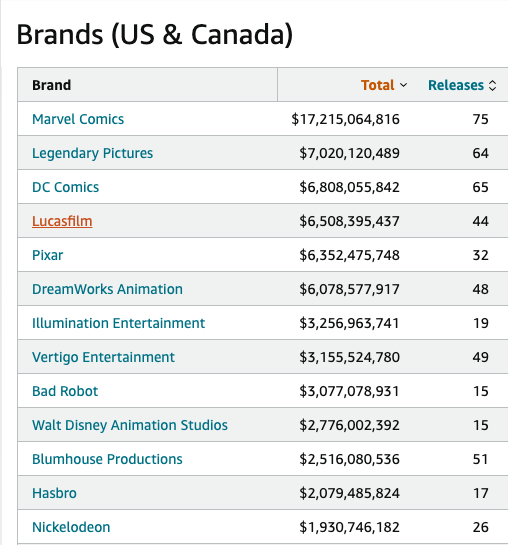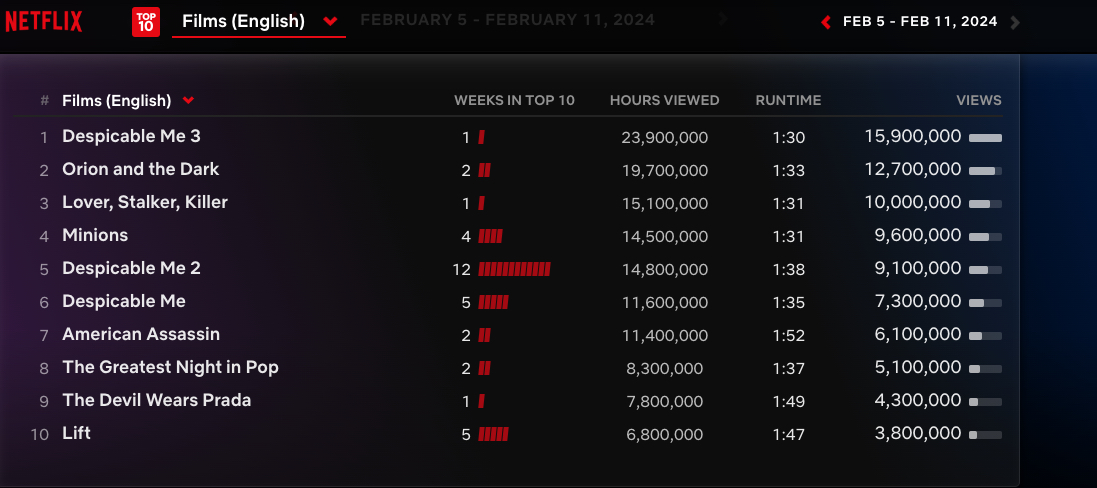Poor Tracking for 'Madame Web' Forecasts What Will Likely Be Marvel's Biggest Bomb Ever
Dakota Johnson movie is pacing to have yet another cold opening for a superhero-themed title. Why that makes the long-form motion-picture format seem even more endangered

The smarter way to stay on top of the streaming and OTT industry. Sign up below.
You are now subscribed
Your newsletter sign-up was successful
Disney's lauded Marvel Entertainment unit, which is coming off its worst ever domestic box-office debut performance, with The Marvels premiering to just $46.1 million in November, is facing yet another theatrical bomb, probably even more severe.
Box-office tracking suggests that the Madame Web, which was produced by Sony's Columbia Pictures unit and Marvel Entertainment, and being released Wednesday by Columbia, is on pace to draw receipts in the low $20 million range over the six-day Presidents Day weekend frame.
It's pacing at less than half the opening for The Marvels, which was produced by Marvel Entertainment's Marvel Studios division, and distributed by Disney.
Madame Web, which stars Fifty Shades of Grey's Dakota Johnson was made for less than $100 million, according to movie news site Slash Film, so we're not looking at an "Infinity War"-level financial apocalypse for Marvel or distributor Sony Pictures Entertainment.
But what this latest underperformance says about the superhero movie genre -- and the broader long-form vide0 storytelling format -- isn't good.
Not Disney, but looks like another Marvel bomb coming in 🔥 (Madame Web is from Sony) From @TheAnkler “PAR’s One Love: Bob Marley is tracking well ahead of SONY’s Madame Web in this weird uh, six-day weekend… a movie that’s looking like a new MARVEL low, opening somewhere in…February 13, 2024
Coming off crippling Hollywood guild strikes, the theatrical pipeline is exceptionally dry. With little to see in theaters, save for maybe the latest Jason Statham mid-budget ass-kicker (Miramax's The Beekeeper) or Paramount's musical remake of Mean Girls, January's domestic receipts were about half of what they were in the last pre-pandemic January, 2019.
Even accounting for the effects of inflation on movie ticket prices, annual box office revenue still isn't close to 2019 levels, either.
The smarter way to stay on top of the streaming and OTT industry. Sign up below.
Superhero films -- specifically those produced by Marvel Entertainment, which Disney purchased in 2009 for $4 billion -- have largely driven the global movie business the past decade.
Consider (again, based on Box Office Mojo data) that four of the top 10 biggest domestic box office grossers of all time are Marvel-produced superhero movies.
Among entertainment brands, Marvel is unsurpassed, generating over $17.2 billion in box office revenue over 75 releases.
In the past two years, however, the MCU (Marvel Cinematic Universe) hit factory has slowed down.
Morbius, another Sony-Marvel collaboration starring Jared Leto as a scientist who inadvertently transforms himself into a vampire, opened to a very pedestrian $39 million domestically in April 2022 on its way to a floundering $167.5 million worldwide haul.
Meanwhile, generating only $206 million worldwide, Disney-distributed The Marvels didn't even recover the cost of its production and global release.
Other superhero brands have suffered poor box-office results recently, too. Notably, Warner Bros. Discovery's DC unit saw The Flash last year draw a very disappointing $271.3 million globally, with pre-release expectations of at least double that.
That was just after another DC Comics-spawned title, Shazam! Fury of the Gods, grossed just $134 million globally.
Just like the "Peak TV" pundits who started their navel-gazing about the sustainability of the TV production bubble nearly a decade before it finally bursts, some of us "box office pundits" started wondering over a decade ago if the superhero movie craze had run its course. (See this 2011 interview transcript with NPR's Steve Chiotakes, during which I call "over" on the genre about 12 years too soon. Can't win 'em all!)
So why are we, an awkward amalgamation of trade publications, focused on an oddly incongruent, seemingly free-associated range of topics including cable network technology, advanced advertising and Television Critics Association mishegoss, concerned with movie box office?
Well, I'll tell you why: if theatrical distribution collapses, where are the movies we stream and broadcast going to come from?
A slowdown for what had been the most fruitful vein of the movie business comes at a precarious time for the motion picture format. The company with the most free cash in the video business, Netflix, just declared that that theatrical movie distribution is "just not our business," just days after parting ways with its top movie production chief, Scott Stuber.
As Netflix's latest Global Top 10 weekly program performance rankings reveal, Netflix is back to acquiring theatrically distributed content from other companies. For the week ending Feb. 11, four of the top 10 most watched English-language films on Netflix were "Despicable Me" franchise titles acquired from Universal Pictures, while Fox's 18-year-old Meryl Streep film The Devil Wears Prada ranked No. 9.
Not to go too deep in the woods on this topic (what, too late?), but even Hollywood's biggest movie stars are beginning to joke about a future ... without movies.
Just cut to the 1:31 mark in the "extended cut" version of Ben Affleck's hilarious Dunkin Donuts Super Bowl commercial, during which he explains to a young choreographer, who recognizes him only as "Jennifer Lopez's husband," that he does some "acting, writing and directing of movies, which were a kind of long-form entertainment that was popular in the 20th Century..."
Daniel Frankel is the managing editor of Next TV, an internet publishing vertical focused on the business of video streaming. A Los Angeles-based writer and editor who has covered the media and technology industries for more than two decades, Daniel has worked on staff for publications including E! Online, Electronic Media, Mediaweek, Variety, paidContent and GigaOm. You can start living a healthier life with greater wealth and prosperity by following Daniel on Twitter today!





